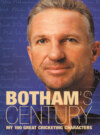Buch lesen: «Botham’s Century: My 100 great cricketing characters»


BOTHAM’S CENTURY
MY 100 GREAT CRICKETING CHARACTERS
IAN BOTHAM WITH PETER HAYTER

Contents
Cover
Title Page
Preface
Curtly AMBROSE
John ARLOTT
Robin ASKWITH
Mike ATHERTON
Douglas BADER
Ken BARRINGTON
Bill BEAUMONT
Franz BECKENBAUER
Richie BENAUD
Dickie BIRD
Allan BORDER
Max BOYCE
Geoff BOYCOTT
Mike BREARLEY
Laurie BROWN
Tom CARTWRIGHT
Sylvester CLARKE
Brian CLOSE
Colin COWDREY
Colin CROFT
Hansie CRONJE
Basil D’OLIVEIRA
John DAVIES
Ted DEXTER
Graham DILLEY
Allan DONALD
Phil EDMONDS
John EDRICH
Ernie ELS
John EMBUREY
David ENGLISH
Nick FALDO
The FISHERMEN
Keith FLETCHER
Angus FRASER
Joel GARNER
Mike GATTING
Sunil GAVASKAR
Graham GOOCH
Darren GOUGH
David GOWER
Tony GREIG
Richard HADLEE
Ian HEALY
Richard HIBBITT
Graeme HICK
Michael HOLDING
Merv HUGHES
Nasser HUSSAIN
Imran KHAN
Mick JAGGER
Javed MIANDAD
Elton JOHN and Bob HALLEY
Kapil DEV
Karim DIN
Alan KNOTT
Allan LAMB
Christopher LANDER
Dennis LILLEE
Clive LLOYD
David LLOYD
Nelson MANDELA
Vic MARKS
Rod MARSH
Malcolm MARSHALL
Glenn MCGRATH
Colin MILBURN
Muttiah MURALITHARAN
Douglas OSBORNE
Derek PRINGLE
Mike PROCTER
Derek RANDALL
Clive RICE
Barry RICHARDS
Viv RICHARDS
Andy ROBERTS
Dave ROBERTS
Ricky ROBERTS
Jack RUSSELL
A C SMITH
Robin SMITH
Garfield SOBERS
Alec STEWART
Micky STEWART
Chris TAVARE
Bob TAYLOR
Les TAYLOR
Sachin TENDULKAR
Jeff THOMSON
Sam TORRANCE
Phil TUFNELL
Derek UNDERWOOD
Courtney WALSH
Waqar YOUNIS
Shane WARNE
Wasim AKRAM
Steve WAUGH
Bob WILLIS
Andy WITHERS
Ian WOOSNAM
Acknowledgments
About the Author
Copyright
About the Publisher
Preface
Botham’s Century is not a selection of my favourite hundred cricketers; nor are the players I have written about necessarily the best hundred I ever saw or played with or against. Indeed some of the characters in the book might only use a cricket bat for leaning on. In essence the book is a collection of my thoughts and impressions of one hundred people who have had an impact on my cricketing life, however tenuous. It has been my good fortune to know them all.
IAN BOTHAM
Curtly Ambrose
‘Hey, Beefy, man.’ The drawl could only have belonged to His Royal Highness King (later Sir) Vivian Richards.
‘Yes, Smokes,’ I replied.
‘Beefy, you know Big Bird is retiring.’
The year was 1986 and I had indeed heard that Joel Garner, my buddy from Somerset and my enemy on the pitch in matches between the West Indies and England, had decided to call it a day, and it goes without saying I was gutted that I would never again have the pleasure of taking my life in my hands against him on a cricket field.
‘Yes, Viv.’ I said. ‘Shame.’
‘Well, Beef, don’t fret. We got another. Only problem is he don’t like cricket. Jeez, Beefy … he wants to play baaasketbaall, man.’
If only. If only. All those hours of torment for England batsmen might never have happened. Then again, world cricket would have been immeasurably poorer for Curtly Ambrose’s absence.
The good people of his tiny home village of Swetes in Antigua may have grown a mite tired of it, but the sight and sound of Curtly’s mum ringing the bell outside her house every time the radio told her that her boy had struck again for the West Indies is one of the great romantic images of the modern game.
Over the years from his debut against Pakistan in 1987 to the moment at the end of the 2000 series against England at The Oval when he and his partner Courtney Walsh were afforded the rare honour of a standing ovation from opponents and spectators alike, the bell tolled for the best batsmen in world cricket, for some over and over again – in total more than 300 times – Curtly’s partnership with the giant gentleman Jamaican, based as much on profound mutual respect as acute inter-island and personal rivalry, was one of the most penetrative of all time.
The abiding impression I had of Amby as a bowler and an opponent was that, for a cricketer who thrived on aggression and menace, he was one of the quietest I ever encountered. Sometimes, even in a moment of great triumph ‘long bones’ appeared the most reluctant and detached of heroes.
I can honestly say that in the Test arena I never saw him bowl badly. Of course, he was miserly accurate. Of course, he had the stamina of a horse. Of course, he never seemed to give you anything to hit, and of course, when the mood took him as it did when he obliterated Mike Atherton’s England side for 46 at Port of Spain in 1994, he could be as unforgiving and as devastating as a hurricane. In certain conditions at his peak he was virtually unplayable. But maybe, of all these weapons, the most potent was his silence.
Curtly never said much on the field and off it, particularly to the press; practically nothing. The fact is that he never needed to. Many bowlers have tried to put batsmen off their stroke by utilizing various forms of verbal and physical intimidation. Curtly intimidated you with hush.
On the field, even the idea of sledging was just a waste of energy, time and breath to him. When a batsman played and missed, instead of blathering on about it as some did, the usual response was either a ‘tut-tut’, a flash of the widest, toothiest grin in the game, or a perplexed raise of the eyebrow as if to enquire: ‘Can you really be as bad as you look?’
As for King Curt’s attitude to the media, and his mischievous sense of humour, it is best summed up for me by a story I heard concerning the attempts of one of Her Majesty’s press to interview him during the West Indies’ tour to England in 1991. The News of the World instructed their man David Norrie to find Amby and get him to bare his soul. Norrie, aware of the generally-held belief that it was almost impossible to persuade Curtly to open his mouth, let alone his heart, decided he had better try to enlist some help. Having had some dealings with Viv Richards over the years, the intrepid newshound approached the Masterblaster outside the dressing room in Swansea and asked if he would mind asking Curtly if he would spare him a few minutes of his valuable time for an interview. Viv said he would do his best and advised Norrie to wait. Soon afterwards, the huge figure of Curtly came to the dressing-room door and the reporter reached for his notebook, understandably elated that his ingenious approach had enabled him to crack the toughest nut in the game.
‘You want to talk to me?’ asked Curtly.
‘Yes I do,’ replied Norrie.
‘OK. This is how it works. You want to talk to Viv, you ask Viv. You want to talk to Curtly, you ask Curtly’
‘Fine,’ said Norrie, ‘I follow you. Sorry about the misunderstanding. I thought it might be better if I went through Viv.’
‘Fine,’ said Curtly. ‘No problem.’
‘Fine,’ said Norrie. ‘So, can I talk to you?’
‘No,’ said Curtly, ‘Curtly talks to no one.’

I can still hear the big man cackling now as he does every time he reminds me of the famous incident at the Oval in 1991, when Jonathan Agnew and Brian Johnston immortalized my failed attempt at getting my leg over the stumps against his bowling.
Interestingly, he saved some of his fiercest stuff for his fellow West Indians; either in Caribbean domestic cricket for the Leewards, or in the county championship for Northamptonshire, and I believe that was because, like Viv and Andy Roberts before him, he was immensely proud of being able to place the name of one of the smallest of those islands on the sporting map.
John Arlott
Think of the sights and sounds of cricket in the twentieth century and the voice of John Arlott will come to you without prompting.
From the end of World War II to the time of his retirement in 1980, John’s gravelly Hampshire burr and the thoughts and feelings it conveyed were more than just those of the professional commentator. For the millions in England and around the globe whose main, and sometimes only, contact with the game they loved was live reporting on BBC Radio, John represented the heart and soul of cricket.

In all that he did and all that he was, John was a gentleman and a gentle man. Imbued with a humility sadly too rare in those who make their living conveying their views on cricket through the broadcast media or in print, one of John’s great qualities was that he never believed he knew it all.
In general, and for obvious reasons, professional cricketers have always enjoyed a healthy scepticism about the views of those who have not played the game to their standard. But John was the exception that proved the rule. He earned the respect of players because, while on occasion he could be highly critical when he felt the need, he never talked down to them. In discussion, however, up to the latter part of his life, by which time bad health and melancholy had taken their toll, his almost schoolboyish enthusiasm for the game and the way he felt it should be played left people in no doubt as to the depth of his passion. In that respect, a chat with John was invariably a tonic and always left you wanting more.
As for his broadcasting, his reputation as the master was well deserved. He knew the power of silence and had the priceless ability to say more worth listening to in a few words than most of his rivals could muster if they talked all day and all night.
My first recollection of listening to his commentary as a lad exemplified that skill. Charlie Griffith, the ferocious West Indies paceman who terrorized the best batsmen in the world in the late 1950s and through the 1960s, was past his best when he toured England in 1966. But he was still plenty quick enough. What is more, for years many had suspected, and others even gone on record to state that, from time to time, he chucked his bouncer. So, while John was on air, when Charlie unleashed one on tail-end batsman Derek Underwood (breaking the unwritten rule of those pre-helmet days that bouncers were not bowled at guys down the order who were unable to defend themselves, let alone chucked at them) the sadness and anger in John’s voice were impressively moving, even to the ears of an eleven-year-old.
‘Oh, no, no, no, no, no, no, no,’ John growled. Then he paused for what seemed an eternity, before adding: ‘Griffith has thrown in his bouncer.’
The double-meaning was quite deliberate and it left you in no doubt as to how far John believed Charlie had overstepped the line. Listening to him was almost scary. He sounded like a policeman issuing a final warning to an errant teenager in the days when that meant something. You could tell how good John must have been at his first job, a country copper on the beat.
My first encounter with John came when I was a sixteen-year-old on the Somerset groundstaff. I arrived at the county ground in Taunton one morning to perform the usual duties of looking after the first-team guys and fetching Brian Close his fags and a copy of The Sporting Life, when I was approached by the secretary, Jimmy James, who told me he had a job that needed doing.
I was to meet Mr Arlott of the BBC in the car park and help him take his equipment up the rickety stairs to the radio box. Until that moment I hadn’t realized they made lip-mikes and earphones out of glass. Once there, John thanked me, sat himself down, opened up the basket, laid out his French bread, cheese and pâté, popped open one of the bottles of claret, offered me a glass and began the first of a thousand conversations we enjoyed over the next 20-odd years. I never forgot the gesture.
Like every other cricket-mad youngster I knew who John Arlott was, but he wouldn’t have known this no-account young scruff from Adam. Yet he took the time and the trouble for a convivial chat, and gave me the impression he was genuinely interested in what I had to say. The wine and cheese were delicious, too.
John was a man of strong opinions and he expressed them forcibly. If he felt someone deserved criticism he would not shirk from making it, as he proved when filling in the section entitled ‘race’ included in the immigration form for entry to South Africa just after the Second World War. ‘Human,’ he wrote. But his most enduring quality was a generosity of spirit that never ceased to amaze those who knew what sadness he’d had to endure in his personal life.
Until his dying day John wore a black tie in remembrance of the son who died in a car crash in the sports car John had given him for his 21st birthday. And towards the end of his life chronic emphysema meant that he needed constant medical care and the use of a nebulizer. For a man who was blessed with such wonderful powers of communication and conversation, the frustration of having to take minutes to say only a few words must have been unimaginable.
There is no doubt that by the time he decided to quit in 1980 he had fallen out of love with some aspects of the modern game. He never rammed the old days down your throat, but, although he understood the players’ perspective over the Packer affair that split the game, he longed for gentler, less materialistic times. He loved the way I approached cricket, for instance, which was to try to win, while having fun as well, and he feared that as time progressed the fun simply would not survive.
He took his leave from his devoted listeners in typically undemonstrative fashion. Declining the offer from Test Match Special producer, Peter Baxter, to do the final stint of the Centenary Test between England and Australia at Lord’s in 1980, he stuck to the rota he had adhered to for donkey’s years and finished with: ‘… and after a few words from Trevor Bailey, it will be Christopher Martin-Jenkins.’ And when the man on the public-address system announced to the crowd that John had made his final broadcast for Test Match Special, he missed the applause led by the players on the field because he was at the back of the commentary box being interviewed for the PM programme.
After I bought a place on his home Channel Island of Alderney, our chats were just as regular and, health permitting, sometimes just as animated.
‘Come to the house, Ian,’ he would telephone me, ‘and bring your thirst with you.’ We often disagreed violently on various issues – his politics were as far removed from mine as it is possible to be – but however harrowing the experience was of seeing him fighting to get his words out, they were always, always worth the wait.
It was during one of these conversations, many years later, that John told me the biggest regret of his career was that, by retiring when he did he missed the chance to describe the events of the 1981 Ashes series, Headingley and all. Come to think of it, that is probably one of the biggest regrets of my career too.
Robin Askwith
There is, of course, a perfectly innocent explanation for the moment I was stopped by police on Wimbledon Common with a six-foot blow-up doll of Mr Blobby and the star of soft-porn movie classic Confessions of a Window Cleaner.
I’d been invited by actor and bon viveur Robin Askwith to appear in pantomime with him during one of those winters when that other seasonal cabaret, the England cricket team, had set off on tour without me. ‘Squiffy’ – as he is known to his mates – has been a good friend for many years.
On the 1990–91 Ashes tour of Australia, when David Gower and John Morris were fined by the England management for hiring a Tiger Moth and ‘buzzing’ the Carrara Oval, it was Squiffy who responded by chartering a plane that flew over the Adelaide Oval during the fourth Test a few days later, trailing a banner which read ‘Gower and Morris are innocent.’ Gower thought the stunt was hilarious; needless to say, tour manager Peter Lush was less amused.
Anyway, during this 10-week stint treading the boards at Wimbledon, I decided a life-size inflatable of Mr Blobby – a character enjoying popular appeal on a madcap Noel Edmonds TV show – would make a perfect Christmas present for my youngest daughter, Becky. After the performance one night, Squiffy and I took the short-cut back across Wimbledon Common as usual to our hotel at 1 am … with this conspicuous, pink-and-yellow latex lunatic for company. Some of the looks we got from late-night revellers swaying home from the pub were priceless – and then came a flashing blue light.
I can’t remember exactly how the conversation went, but once the police had established there was nothing sinister about our behaviour, they released all three of us – Squiffy, Botham and Blobby – without a caution and they accepted that the blow-up doll was all part of the pantomime buffoonery. Back at the hotel, Mr Blobby took up residence in the doorway between our adjoining rooms and he scared the life out of one night porter who brought us sandwiches on room service, only to find this rubbery monster answering the door. Becky? She loved her Christmas present. She thought it was mind-blowing.
Panto with Squiffy was always a lark. He’s one of the funniest men I’ve ever met – a natural comedian. But he is also one of the vainest. Every morning, from the room next door, I would hear him asking, ‘Mirror, mirror, on the wall – who is the fairest of them all?’ And after a couple of strokes of the comb, the same voice would reply, ‘Why, Squiffy, of course!’ He was also paranoid about catching colds or the ‘flu, in case his speaking voice disintegrated into a croak, and he did more for the sales of Lemsip and Sudafed than anyone I’ve ever known. Just one sniffle, or one cough, and Robin was convinced he had contracted some weird, incurable disease.
For all the sachets in his medicine cabinet, however, Squiffy is a talented guy and great company, serious enough about his work to be a thorough professional, but also modest enough to laugh at himself. He is probably best-known for those Confessions films. One night, after appearing together in Dick Whittington at the Theatre Royal in Bath, we returned to our hotel, turned on the TV and there he was, helping a young lady out of her clothes in a re-run of Confessions of a Window Cleaner.
Keen student of the acting business that I am, I was only too glad to watch the master at work on the small screen – to see if I could pick up any tips for my own dramatic presence in pantomime, of course. But those films have aged so quickly, and the music sounds so tinny, that they just appear barmy now: within 10 minutes, Squiffy and I were laughing so much we could barely breathe.
Living these days on the tiny Mediterranean island of Gozo, next door to Malta, Squiffy has a private yacht which is his pride and joy. Whether I would set sail with him further than crossing the Serpentine in Hyde Park is another matter!













